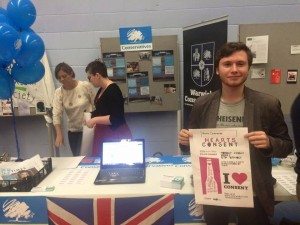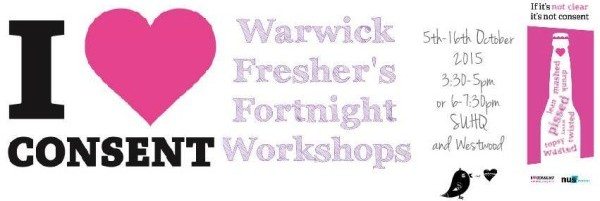Why you should heart consent
[dropcap]I[/dropcap]t seems Warwick can’t get in the national press for anything good, doesn’t it?
For the whole of summer, a group of over 40 volunteers have been working on the ‘I Heart Consent Campaign Warwick’, with the intention of delivering workshops during Fresher’s Fortnight. This group is wide and diverse, with people of all genders, races and backgrounds, but with one thing in common: creating a discussion on campus about sex and consent.
I am sure by now you have seen or heard about the article published on Warwick Tab written by George Lawlor. George claims he does not need consent training because he ‘does not look like a rapist’. George was very offended that he was invited to one of our sessions, and not to a raving house party, which I am sure he gets many an invite to (by the rest of the members of the Warwick Conservatives, of which he is a member of their exec, no less).
Yet what George doesn’t seem to understand is that rapists do not have a particular rapist-esque look about them to announce their intentions to the world. Rape is very rarely carried out by an unknown attacker in a dark alleyway: according to Rape Crisis UK, almost 90% of victims know their attacker. It could be a friend, a relative, someone you trust and admire – and this is why it is so important to get the word out about what consent really means. By opening up a discussion on healthy sexual relationships, the hope is to prevent as many confused situations as possible: to make the clarity and importance of consent known.
It is also a sad fact that Russell Group Universities have some of the worst statistics in handling student sexual assault and rape: 7 of the 24 universities do not systematically record reports of sexual assault, and a further 7 only sporadically record them. 1 in 5 do not have a specific measure in place for victims to record or report any allegations, either. Even more distressing than this is that 30% of female students and 12% of male students in the UK will experience some form of sexual assault or harassment while at University. So while George can bemoan the fact that anyone at Warwick is intelligent enough to know when they have gained consent, it is just mere fact that some of the top higher education institutions in the UK simply do not know how to deal with sexual assault, and that universities as a whole are a common place for such attacks.
But rather than have me – a coordinator of this campaign – tell you how great it is and how wrong George is, let me turn to some people who have actually attended a workshop this week, instead.– Lily Pickard
 For someone who professes to love consent, the sentiments expressed in the article reek of ignorance and privilege. While being “taught to not be a rapist” might seem offensive, the reality of rape is absolutely offensive. No person should have to exist in fear that their power to consent and decide who can or cannot touch them be taken away.
For someone who professes to love consent, the sentiments expressed in the article reek of ignorance and privilege. While being “taught to not be a rapist” might seem offensive, the reality of rape is absolutely offensive. No person should have to exist in fear that their power to consent and decide who can or cannot touch them be taken away.
Surely if you care about consent, being invited to a workshop about it is not a chore? It is proof that the all-important conversation about the rape culture perpetuated in mainstream media is gaining recognition. And that is something to be celebrated.
These consent workshops are not a personal attack on anyone’s character. They are a collective response to a real threat and real statistics. Anyone who takes it as a personal affront is entirely missing the point. And, in fact, only validating a potential rapist’s decision to ignore legitimate advice. – Halimah Manan
Contrary to the offensive comments made in the article, the ‘I Heart  Consent’ workshops facilitated by some of the most passionate, caring and enthusiastic students on campus are a fantastic initiative for engaging in a positive discussion about consent and sex and building a culture of consent in our University community. This initiative is nothing but morally good and is a part of a wider movement taking place across Universities and Students’ Unions. The facilitators are taking on a big and difficult problem in society and their work is nothing short of admirable and is entirely selfless. To call them indulgent and selfish is demeaning and, frankly, disgraceful. – Luke Pilot
Consent’ workshops facilitated by some of the most passionate, caring and enthusiastic students on campus are a fantastic initiative for engaging in a positive discussion about consent and sex and building a culture of consent in our University community. This initiative is nothing but morally good and is a part of a wider movement taking place across Universities and Students’ Unions. The facilitators are taking on a big and difficult problem in society and their work is nothing short of admirable and is entirely selfless. To call them indulgent and selfish is demeaning and, frankly, disgraceful. – Luke Pilot
‘To be invited to such a waste of time was the biggest insult I’ve received in a good few years. It implies I have an insufficient understanding of what does and does not constitute consent’. In the author’s opinion, consent is a simple concept to understand, and anyone who attends a Russell Group university must surely have a solid grasp of it. But how can this be the case when cases of rape and sexual assault are still staggeringly high in these very institutions?
As a ‘decent, empathetic human being’, surely the author should be jumping at the chance to make sure that his preconceived notions of what consent is and is not are correct, and to engage in positive discussion about how sexual assault and rape in university can be tackled. The issue certainly isn’t a minor one – just read Women’s Officer Josie Throup’s Tab article, ‘Why consent workshops are a necessity’ for some harrowing statistics. The writer is mistaken in assuming that his invitation to the workshop is an accusation; it’s an invitation to learn more and take that knowledge back to his society and friends in order to extend the discussion. Just as being invited to a workshop called ‘I Heart Racial Equality’ doesn’t assume you’re racist, the ‘I Heart Consent’ workshops aren’t trying to pick out everyone who doesn’t understand consent and force their attendance. For someone who claims to be well informed, the writer certainly should have done a little more research. – Bethan McGrath
Like any “self-respecting individual” would, I found George Lawlor’s article to be a “massive, painful, bitchy slap in the face”. It made me feel as if George needs to “get off his fucking high horse”, as upon realising that it wasn’t actually a troll article, my “crushing disappointment quickly melted away and was overcome by anger”.
Clearly George feels that he does not need consent lessons. He tells the “self-appointed teachers of consent” to go out into the real world and do something useful. Apparently this is not it. George knows that this is not it, because George knows how to be a teacher of consent, or, as he puts it; “when it’s okay to shag someone”.
Running through his article is the insistence that the predominantly female WASS are “bitchy”. There is the recurring theme that George knows when George wants to have sex with someone – he is doing the sexing, they are doing the receiving. There is the idea of dominance, the idea of female cattiness and the idea of ridicule; all from a single Facebook invite.
Perhaps George doesn’t consider that rape culture and consent impact him too; approximately 9,000 men a year are victims of rape or attempted rape. Yet it can seem that young men are being brought up in a world where they are still addressed as potential rapists; George chooses to condescend the very workshops that, by creating a safe space on campus for all genders, aim to address such preconceptions.
In George placing a heavier value on his pride than ensuring this safety at Warwick, he does little to take a stand against the normalisation of rape culture. It seems that George would rather spend his time getting angry about Facebook invites than he would about something that really matters – making a difference. – Elizabeth Pugsley
The article epitomises an ignorant, narcissistic, egotistical and misogynistic culture among many white privileged men that stems from the idea that they’re irresistible. This comes from the view of a fairly privileged white man.
Because they’re born into wealth, a certain skin colour and have been lucky enough to be intelligent (or at least have the opportunity to a good education) there’s a notion that they’re de facto anti-sexual abuse and don’t “look like rapists” because they don’t have to rape. This doesn’t mean that they reject the idea of it because it’s a morally abhorrent disgusting crime but they reject the idea of it because it personally insults them, that they could ever be considered rapists.
Lawlor even specifies in the article how even being invited to the event personally hurt him, showing a complete callous disregard for the victims of rape and a refusal to make any effort at all to prevent further attacks. – Christopher Tobin
I had my preconceptions about these workshops before I walked through the door. I didn’t think that they would be particularly useful, and I was only going because I had to. I imagine that there were a lot of people in the same position. However, in the first 10 minutes of sitting with the group, I realised that I wasn’t that well informed. Consent, as a premise, falls in this weird realm of absorbed, assumed knowledge that you are supposed to pick up through social interaction and inevitably by making mistakes. However, that simply isn’t good enough.
To measure consent as a simple “yes” or “no” response is to devalue the understanding of what these workshops are actually about. For a start, consent means you can change your mind and that is okay. It was actually quite uncomfortable for me to sit and think about situations involving myself and friends that I could remember that would have been crossing the line. And you have all seen something you should have stopped. Interestingly, I followed the workshop with a circle and then Pop! which gave me instant access to some of the things that had been discussed. It wasn’t pretty.
Once you open your eyes to what is really going on, it pushes to think and vocalise behaviour that is assumed to be normal, even when you know it is wrong. And it isn’t to do with men, women, or any clichéd stereotypes. The reality is that it is usually someone you know and trust, and that is the most upsetting thing of all.– Hiran Adhia
What I found most striking about George Lawlor’s scathing article about the I Heart Consent workshops, was the incredible anger behind the piece. Lawlor has chosen to react by taking the workshops as a personal attack on men, and more specifically, himself.
Yet, if he had attended, he might have been involved in a discussion about how our laws are heteronormative and do not adequately protect the LGBT+ community, or about the reality of men getting raped. Our education in school fails to cover consent, so these discussions now are essential. His assumption that, “Yes means yes, no means no…You’d think Russell Group university students would get that much” is quite frankly naive.
Inevitably we will have different backgrounds and understandings of consent, and nothing is obvious about it. At the workshop that I attended, someone asked, “so what exactly does ‘patriarchy’ mean?”, suggesting an absence of education about the fundamental structural inequality in our society, let alone the multitude of issues that follow. The fact that he feels so affronted and insulted suggests a lack of understanding of the experiences of others, and the hype around his article distracts from the real purpose and validity of the campaign.
Fundamentally, it’s not about attacking anyone, or assuming all men are rapists, no one is saying that. The workshops promote mutual respect, empathy, and education. Lawlor concluded by imploring workshop leaders to “have a little respect for the intelligence and decency of your peers”, yet he has failed to do so himself.– Zoë Morrall


Comments (11)
One more thing, the ONLY way to prove you obtained affirmative consent is to record your sexual encounters. Everyone owns a smart phone, so record (audio not video) and maintain the recording of every sexual interaction you have during college. Your future depends on it.
To be honest though, if you’re scared a girl is going to question the whole legitimacy of the thing later on you shouldn’t even be bothering to go near them let alone trying to make it work.
The true intent of the “affirmative consent” campaign in the U.S. is to shift the burden of proof from the accuser to the accused, which is contrary to all of our bedrock beliefs about due process. Combine that with the “believe the survivor at all times” mantra of third-wave feminism and it’s pretty clear the purpose of the “heart consent” campaign is to guarantee an accusation = conviction. And then you pile-on the fact that attempting to defend oneself against a sexual assault accusation is the very definition of “victim blaming” according to the same feminist cabal.
But why worry about destroying the reputations/lives of a tiny percentage of accused men because we all know only 3% of sexual assault/rape claims are false? Or according to women’s studies professors in the U.S., it’s between 2% and 8%. Feminists claim that’s a small price to pay for the >90% of actual sexual assaults for which their is no conviction. Let’s ignore the fact that destroying the life of even one innocent person should be anathema, the fact is that many studies show 25% and even 40% of sexual assault accusations are false.
During a 9-year study conducted by former Purdue sociologist Eugene J. Kanin, over 40% of complainants eventually admitted that no rape had occurred (Archives of Sexual Behavior, Vol. 23, No. 1, 1994). Kanin also studied rape allegations in two large Midwestern universities and found that 50% of the allegations were recanted by the accuser.
And Kanin’s findings are hardly unique. In 1985 the U.S. Air Force conducted a study of 556 rape accusations. Over 25% of the accusers admitted, either just before they took a lie detector test of after they had failed it, that no rape occurred. A further investigation by independent reviewers found that 60% of the original rape allegations were false.
Feminists claim, “If you believe in equality between the sexes, you’re a feminist.” Unfortunately, as described above, feminism in practice is often just as oppressive as the “patriarchy” they insist exists but cannot really identify. Ultimately, I recommend you don’t adopt our (the U.S.’s) PC insanity. Whether the accusation concerns racism, ableism, feminism, toxic-masculinityism, justinbieberactuallyhasabigdongism, or any of the MANY other -isms, the bottom line is that these special interest groups are trying to extinguish the “reasonable person” standard in order to usher in the “tyranny of the individual.”
A great article in places and just completely missing the point in other places. Too long for me to address in its entirety but just a couple points. At its heart is this idea that an invitation to a consent class is neutral and apolitical. Moreover, implicitly the article suggests that if the subject-matter (consent and its grey areas) is worth addressing then rejecting an invitation to address it immediately casts the reject-or as not caring or against the subject-matter. That logic just doesn’t follow; he self-admittedly does care and knows about consent. It is pure assumption and a plain attempt to regulate somebody’s behaviour to argue to the contrary.
‘Just as being invited to a workshop called ‘I Heart Racial Equality’ doesn’t assume you’re racist, the ‘I Heart Consent’ workshops aren’t trying to pick out everyone who doesn’t understand consent and force their attendance.’
Superficially, this paragraph is correct. However, if one wants to more accurately analogise – if white people are pressured into attending even though they self-admittedly recognise the problem of racism and actively try to check their white privilege then yes they are being treated as potential racists.
‘Running through his article is the insistence that the predominantly female WASS are “bitchy”. There is the recurring theme that George knows when George wants to have sex with someone – he is doing the sexing, they are doing the receiving. There is the idea of dominance, the idea of female cattiness and the idea of ridicule; all from a single Facebook invite.’
I think this is just simple over-analysis to the point where its slid into highly personal attack to try as hard as possible to categorise his argument into a neat box of classic male privilege/man in subject-position. At no point does he suggest female WASS are “bitchy’ nor is it implied. To infer from his article the notion of dominance from, ‘shag someone’ is just fantasy. It is natural for all genders to be the ones doing the sexing in tandem with being sexed, since they make up one part of that equation. George knows when George wants to have sex with someone because George is George – not because of some self-absorbed valorisation of dominance.
‘Perhaps George doesn’t consider that rape culture and consent impact him too; approximately 9,000 men a year are victims of rape or attempted rape. Yet it can seem that young men are being brought up in a world where they are still addressed as potential rapists; George chooses to condescend the very workshops that, by creating a safe space on campus for all genders, aim to address such preconceptions.’
Just another rhetorical technique to posit that Lawlor doesn’t care about these men, because of his refusal to attend the workshop. Its a running flaw through this article.
‘This doesn’t mean that they reject the idea of it because it’s a morally abhorrent disgusting crime but they reject the idea of it because it personally insults them, that they could ever be considered rapists.’
Just a confusion – it seems. He rejects the invitation because its personal insulting – he rejects rape because it a morally abhorrent disgusting crime. The rest of Tobin’s entry is just assumption that not attending the workshop is correspondingly a slight on rape victims. I think its disgusting to instrumentalise their experience in that way. Their experiences are surely multiplicitous rather than homogenous. He does in his article suggest other ways to tackle rape culture (though extremely insufficient on Lawlor’s part to be sure)
‘Lawlor has chosen to react by taking the workshops as a personal attack on men, and more specifically, himself.’
For the Warwick campaign I do agree it was an overreaction since its not solely men targetted but just members of sports execs. However, for the national campaign, there is an overt targeting of men, exemplified by the Oxford Rugby Team. The problem I think is less the consent class in itself, its the demographic being targeted.
Another problem is this disconnect between intention and reception. These consent classes aren’t intended to be a personal attack, they aren’t intended to be an accusation, but they end up being one. This is, I’m sure, in their authors’ eyes because of sexually deviant white men – but more probably because an invitation isn’t neutral and apolitical but in itself accuses and personalises people who are sent the invitation and casts them as a rapist-to-be if not educated otherwise. Obviously not the intention as it continuously specified, but that is the reception nonetheless.
‘Fundamentally, it’s not about attacking anyone, or assuming all men are rapists, no one is saying that. ‘
Again the assumption is that invitations are inculcated with no meanings at all. No one is saying it, but it is implied by the distribution of the invitations. (again national campaign).
“Too long for me to address in its entirety”
Right back at ya Fred
I think the comment was addressing the fact that George is a Warwick Conservative exe. It’s not an attack on his political beliefs at all. As an exe. he’s in a position of responsibility to welcome students not only in the Tory society but participation in the SU overall.
Overall a good piece, but the stab at Warwick Conservatives was incredibly petty. Why the first contributor felt the need to resort to childish political point-scoring in an article which is about a very serious topic is beyond me, and quite frankly a little insulting to the whole issue.
“George was very offended that he was invited to one of our sessions, and not to a raving house party, which I am sure he gets many an invite to (by the rest of the members of the Warwick Conservatives, of which he is a member of their exec, no less).” – Is this the most petty thing I have ever read in a ‘newspaper’ article. Surely you can’t expected to be taken seriously as a journalist?
I agree with James. What on earth do George’s political allegiances have to do it? Completely irrelevant – comment itself ‘distracts from the real purpose and validity of the campaign’.